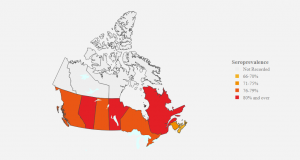“In order to tailor public health strategies to the current pandemic context, it is important to understand the prevalence of COVID-19 across Canada. Since the winter of 2021-22 with the onset of the Omicron wave, PCR testing for diagnosis of SARS-CoV-2 has failed to keep up with the rapid growth in infection across the population. The CITF has therefore drawn on serosurveillance studies (measuring antibodies due to infection and vaccination in a person’s blood) to provide updated estimates of the magnitude and trends in SARS-CoV-2 infection in Canada.” (Source: CITF)
Along with more than 20 studies, blood spot samples from Atlantic PATH participants and CanPath participants across the country helped to inform work from the COVID-19 Immunity Task Force that found that 78.5% of Canadians had antibodies due to infection by April 30, 2023.
You can find an interactive map prepared by the Data and Analysis Team at the COVID-19 Immunity Task Force here: https://www.covid19immunitytaskforce.ca/seroprevalence-in-canada/
 COVID-19 Infection Induced Seroprevalence (Source: CITF)
COVID-19 Infection Induced Seroprevalence (Source: CITF)
Although Atlantic Canada had the lowest infection rates inthe country through most of the pandemic, the increases seen during the spring and summer of 2022 resulted in a seroprevalence comparable to other regions by fall 2022. This was due to a rate of increase in Atlantic Canada during the early Omicron waves that was higher than other regions.
Please visit CITF for additional details from this work: https://www.covid19immunitytaskforce.ca/seroprevalence-in-canada/
#PopulationHealth #Cohorts #HealthResearch
